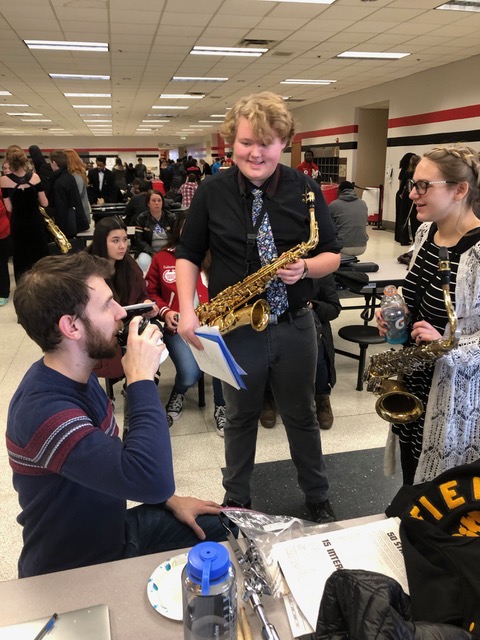Band Students Score at ISSMA, Head To State
February 8, 2019
The GHS band and choir students competed in Indiana State School Music Association (ISSMA) Solo and Ensemble at Wilbur Wright Middle School, in Munster, on January 26. Several students attended as soloists, in ensembles, or both, playing a variety of instruments and musical compositions. “It’s an opportunity to challenge yourself as a musician in an individual and/or a group setting,” said senior Molly Mills. Mills played a Group 1 baritone saxophone solo and with a Group 1 saxophone trio. “It’s a time when you put together music your own way and get commentary and feedback on your work.”
“ISSMA Solo and ensemble is an event that requires students to learn and perform music on their own in front of a judge,” said band director Aaron Alexander. “Each student receives feedback, a score, and a gold, silver, bronze, or participation rating. If a student performs from a list of difficult music and receives a gold rating, they continue on to perform at a state event. We had twenty-seven entries this year, and everyone received either a gold or silver rating.” There are five divisions, with Group One being the most difficult. For Group One, musicians can only choose music from a list and are judged by high standards; gold medalists have the opportunity to participate in State ISSMA, which takes place in Indianapolis. Junior Charles Murphy, junior Liana Boulles, junior Ryan Dudlicek, and sophomore A’rion Davis received gold in Group 1 and will attend State ISSMA on February 23.
“Solo and ensemble is important because it asks students to prepare music on their own with minimal assistance from me as their teacher,” said Alexander. “The way they perform is set-up to resemble a college audition that is required to obtain a music degree. This is experience includes an incredible amount of stress, so having students practice creating music in this atmosphere is important. Students who advance to state qualify for other opportunities like performing with statewide auditioned music ensembles.”
Reasons for joining ISSMA are varied, but the universal motive is a desire to become a better musician. The months before ISSMA were spent choosing, practicing, and perfecting the participants’ music. Ensembles were able to meet in school, but most opted to practice together outside of schools. Soloists could receive aid from Alexander, fellow students, or private instruction. Mills advised students to start practicing months, not weeks, ahead of competition.
“Sometimes I can’t play three measures, and the next day I’m playing the whole thing fluently,” said Davis. “[It’s] pretty chaotic, but it’s good to the see change. I went from barely laying the first measure to playing everything. ISSMA has made me a better musician. It drives me, makes me feel like a better musician. Music isn’t just songs and notes, it’s a language you choose how to play. I’m passionate about that. I’m very competitive, and for me, this is a competition I have to win.”
A common pet peeve of performers and teachers alike is the nerves. Having their playing ranked, picked apart, and assigned a medal is extremely stressful and can hurt mental health in the days leading up to ISSMA. In worst case scenarios, students are unable to perform their pieces well due to their fear and end up getting bad scores. Alexander said that students frequently find the judges intimidating and picky, when in reality, they want the student to succeed and improve.
“It’s not the medal you go for, it’s the experience and the feedback,” said Mills.


